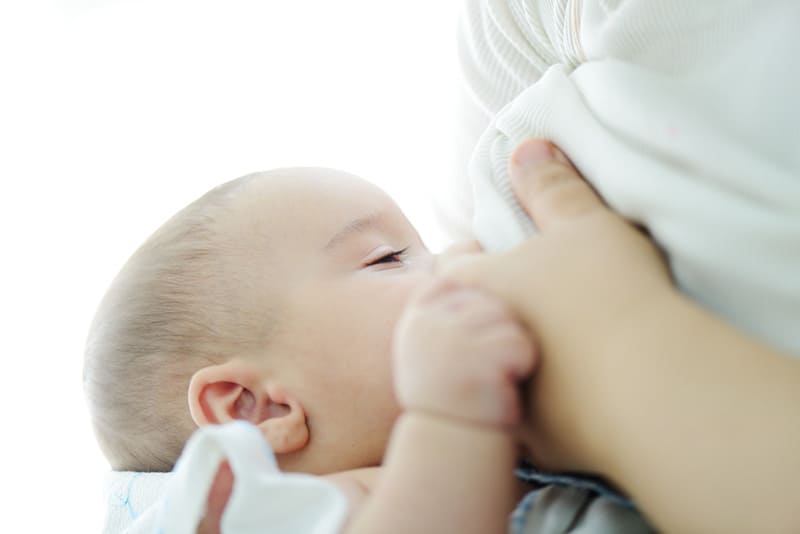You may have noticed something odd during your nursing sessions – a weird clicking sound when breastfeeding that comes from the area around the nipple.
The clicking sound when breastfeeding usually occurs when the baby’s mouth is poorly latched.
This can be due to a variety of reasons, but the most common ones are an improper feeding position, flat nipples, or an issue with the milk supply.
Whatever the case, it’s nothing too serious and shouldn’t cause any major problems, but it’s very likely that he’s swallowing a lot of air with the breast milk.
If the problem persists over a period of time, it would be wise to find a lactation consultant to help pinpoint the issue and eliminate it because if an oversupply of milk is part of the problem or an imbalance of hindmilk and foremilk, your baby might have extra weight gain.
Be aware that there are other sounds that your child will make during a feeding session that are completely harmless so try not to panic over every single one. Take it easy and everything should be okay.
Read on to find out exactly what causes the sound in question, what other sounds you should be expecting that are normal and what can be done to prevent the clicking in the future.
What’s The Cause Behind The Clicking Sound When Breastfeeding?

There are a variety of different reasons behind the clicking noise that you may be hearing when you breastfeed your child.
However, it’s worth noting that almost none of them are dangerous and it’s most commonly associated with a poor latch.
While the result is the same, the actual causes of clicking can vary significantly.
The most common issues are:
1. An improper latch
Regardless of whether your little one is breastfeeding or bottle-feeding, chances are that he’s going to have a hard time latching if the position you’re holding him in is somewhat awkward.
If you’re uncertain about which positions help you get a good latch, don’t hesitate to call your lactation consultant (IBCLC) for help on the matter.
Usually, these positions are covered in parenting classes, but it’s not uncommon that people forget about it due to stress, excitement, or a variety of other factors.
The easiest way to determine if your little one hasn’t latched properly is if you see that the baby’s head isn’t placed directly opposite the nipple.
This will make it difficult for him to get a proper hold on it and he’ll constantly have to work for his food.
As the baby’s tongue shifts with his mouth to try and slink the breast over to his end, you will likely hear the clicking sound when breastfeeding.
2. An oversupply of milk

Sometimes the problem isn’t something you can directly control like a proper feeding position.
It could be a temporary problem such as a forceful letdown occurring due to an excess in milk supply.
The fast flow of milk from the forceful letdown overwhelms your baby who tries to keep up with the increased milk flow, leading to a lot of gulping and gagging which causes a fussy baby.
It also leads to increased risks of colic in babies.
In order to prevent this issue in the future, you can try breastfeeding in a laid-back position or feeding your baby more often.
3. Breast engorgement
One of the most irritating problems that causes a clicking sound when breastfeeding is engorged breast tissue.
Not only does it make it hard for your child to latch as your nipples become flatter and your breast becomes more sensitive, but you might also experience a whole lot of additional potential problems.
Things like nipple soreness, nipple cracking, and overall nipple pain – as well as issues in milk production – are all potential issues you should be aware of.
Some women not only develop sore nipples but clogged milk ducts and mastitis on top of all that.
If the problem causes your child to frequently unlatch from the nipple and you hear a lot of smacking and grunting noises that don’t sound normal, I suggest seeking pediatric help as soon as you can so the problem can get resolved.
A good indicator, outside of the clicking noise and the discomfort in your breasts, is slow weight gain, as well as general fussiness.
Make sure to pay attention so you can catch the issue early.
4. A lip tie/tongue tie

Tongue and lip tie can prevent your baby from getting a proper latch, leading to the clicking noise.
These are physical abnormalities in the oral area that make it hard for your baby to feed properly.
In the worst-case scenario, the frenulum connecting the tongue to the floor of the mouth (or the one connecting the lip to the gums) is thicker than normal.
This causes an elastic reaction that pulls the connected tissues back to their original positions.
Your baby will need to work extra hard just to get into a proper feeding position – it probably feels as though someone is pressing the reset button on his mouth position every time he tries adjusting it to feed.
These things are usually resolved through surgery but might also go away on their own.
5. An ear infection
An ear infection can be really irritating and distracting.
This is especially true for babies as it can be the cause of pain and discomfort when breastfeeding since there’s a steady bit of pressure build-up in the ears during the session.
When it gets to a high enough point, it may start to hurt them or feel slightly uncomfortable.
It may cause enough discomfort or pain that they can’t take it anymore and will let go just to relieve the pressure.
This, in turn, will produce the clicking sound as the baby’s tongue and lips detach from the nipple.
If you see your child breaking off the nipple often, it might be a telltale sign that he’s suffering from an ear infection and it would be wise to go in for a check-up at the pediatrician.
6. Thrush

Arguably one of the most irritating causes of a poor latch and the subsequent clicking sound when breastfeeding is thrush.
It’s a type of yeast infection, a fungus that appears in your child’s mouth as a white, rash-like surface.
If that’s not enough of an indicator, look for a reddened and inflamed mouth that seems cracked in places or look for general signs of discomfort in your child whenever something comes into close contact with his mouth.
The infection can be transferred from mother to child and vice versa as it’s caused by a bacterial imbalance within the body that allows this specific fungus to thrive and spread at a rapid pace.
The most frequent cause is an excess of antibiotics.
Luckily, it’s easily treatable and doesn’t cause any complicated problems outside of temporary discomfort.
7. Teething
Last but not least, as far as hearing the sounds of clicking while breastfeeding, is teething.
When your little one’s teeth start coming in, it can leave the mouth sore, causing discomfort for the child when he presses his gums onto the nipple.
This results in the baby pulling off the nipple which will produce the clicking sound.
It’s only temporary, thankfully, as your little one will adjust to the discomfort, plus it will go away with time.
Sounds You’ll Hear While Breastfeeding

Clicking isn’t the only noise that you’ll experience when nursing, there are plenty of others that sound similar but that aren’t a sign of any problem.
You’ll hear inhaling and exhaling as well as sounds of gentle sucking and swallowing in between.
Be careful not to confuse the sucking with clicking.
You might also hear grunting if your child puts a bit too much energy into feeding, usually around the time where he needs a bit of a break.
How To Tell If Your Baby Has Trouble Latching

If you’re not sure whether your baby has a good latch or not, there are a few signs that will let you know.
These are:
• Evident oral problems
• Dimpling during sucking
• Slow to no weight gain
• Sore nipples
• Temporary nipple deformation right after a feed
In Conclusion

Hearing a clicking sound when breastfeeding isn’t anything you should panic about.
Sometimes a bad latch happens when your hand accidentally slips or your child is feeling a bit under the weather, and this causes a clicking noise.
But, if it’s starting to happen frequently during feedings and is affecting your child’s weight gain, you should look into it further.
However, don’t try diagnosing the problem yourself.
No matter how harmless, it’s still better to consult a lactation consultant (IBCLC) or a pediatrician on the matter for proper advice.
They’re there to help you and your child out with any discomfort or medical problem that you might have.
Their advice is going to be infinitely more helpful than anything you’ll be able to pick up from the internet.
As always, the things I write about are general guidelines that help serve as a reference on what the potential issues might be, not as a replacement for a doctor’s visit.
Just remember, mammas, a mamma who worries about doing a good job is probably doing a good job!
Like this post? Please share or pin it for later. You can also stay in the loop and follow us on Facebook, Instagram or Pinterest.

We love honesty! Find Your Mom Tribe is an Amazon Associate and we earn from qualifying purchases through affiliate links at no extra cost to you. Please see our full Amazon Affiliate disclosure for more information.

